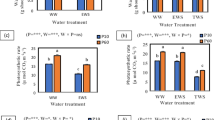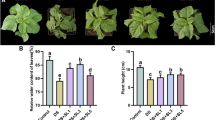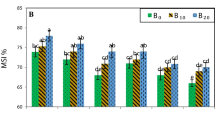Abstract
In this study, the potential of co-application of biochar and seed priming with nano-sized chitosan-proline seed priming to improve salt tolerance in bread wheat was evaluated. For priming, the seeds of two differentially responding bread wheat genotypes, Messani White (salt-sensitive) and SIS-12 (salt-tolerant), were soaked in nano-sized chitosan-proline solution (nano-priming; 100 mM) or water (hydropriming) for 18 h. The wheat seeds were planted in plastic pots filled with acid-washed sand (2.5 kg) containing biochar (25 g kg−1 sand) or not under normal (0 mM NaCl) or saline (120 mM NaCl) conditions. Salinity was imposed using NaCl in increments of 40 mM. Salinity stress significantly reduced the growth and carbon assimilation in both tested genotypes. Seed priming with nano-proline and the biochar application significantly improved plant growth and carbon assimilation. However, the combined use of biochar and nano-priming was more effective in improving salt tolerance in tested wheat genotypes than the sole application. Biochar application instead triggered sodium and chloride uptake but contributed to salt tolerance through an increase in potassium contents, accumulation of proline, and activation of the antioxidant defense system. Nano-priming improved the salt tolerance in tested wheat genotypes through ionic homeostasis, activation of the antioxidant defense system, and osmotic adjustment. Co-application of biochar and nano-priming significantly improved salt tolerance in wheat genotypes through ionic homeostasis, osmotic adjustment, maintenance of tissue water status, activation of antioxidant defense system, continuation of the carbon assimilation, and sustained plant growth.





Similar content being viewed by others
Data Availability
The data of this study are available from the corresponding author upon reasonable request.
References
Al Hinai MS, Ullah A, Al-Rajhi RS, Farooq M (2022) Proline accumulation, ion homeostasis and antioxidant defence system alleviate salt stress and protect carbon assimilation in bread wheat genotypes of Omani origin. J Environ Exp Bot 193:104687. https://doi.org/10.1016/j.envexpbot.2021.104687
Al-Farsi SM, Al-Sadi AM, Ullah A, Farooq M (2021) Salt tolerance in alfalfa landraces of Omani origin: morpho-biochemical, mineral, and genetic diversity assessment. J Soil Sci Plant Nutr 21:1484–1499. https://doi.org/10.1007/s42729-021-00455-7
Ashraf M, Munns R (2022) Evolution of approaches to increase the salt tolerance of crops. Crit Rev Plant Sci 41:128–160. https://doi.org/10.1080/07352689.2022.2065136
Barr H, Weatherley P (1962) A re-examination of the relative turgidity technique for estimating water deficit in leaves. Aust J Biol Sci 15:413–428. https://doi.org/10.1071/BI9620413
Bates LS, Waldren RA, Teare ID (1973) Rapid determination of free proline for water stress studies. Plant Soil 39:205–207. https://doi.org/10.1007/BF00018060
Bradford MM (1976) A rapid and sensitive method for the quantitation of microgram quantities of protein utilizing the principle of protein-dye binding. J Anal Biochem 72:248–254
Chan KY, Van Zwieten L, Meszaros I, Downie A, Joseph S (2007) Agronomic values of greenwaste biochar as a soil amendment. Soil Res 45:629–634. https://doi.org/10.1071/SR07109
Chance B, Maehly A (1955) Assay of catalase and peroxidase. J Meth Enzymol 2:764–817
Corwin DL (2021) Climate change impacts on soil salinity in agricultural areas. Eur J Soil Sci 72:842–862. https://doi.org/10.1111/ejss.13010
Courtney AJ, Xu J, Xu Y (2016) Responses of growth, antioxidants and gene expression in smooth cordgrass (Spartina alterniflora) to various levels of salinity. Plant Physiol Biochem 99:162–170. https://doi.org/10.1016/j.plaphy.2015.12.016
Egamberdieva D, Alaylar B, Kistaubayeva A, Wirth S, Bellingrath-Kimura SD (2022) Biochar for improving soil biological properties and mitigating salt stress in plants on salt-affected soils. Commun Soil Sci Plant Anal 53:140–152. https://doi.org/10.1080/00103624.2021.1993884
El Hadrami A, Adam LR, El Hadrami I, Daayf F (2010) Chitosan in plant protection. Mar Drugs 8:968–987. https://doi.org/10.3390/md8040968
Farooq M, Wahid A, Kobayashi N, Fujita D, Basra SMA (2009) Plant drought stress: effects, mechanisms and management. Agron Sustain Dev 29:185–212. https://doi.org/10.1051/agro:2008021
Farooq M, Hussain M, Wakeel A, Siddique KHM (2015) Salt stress in maize effects resistance mechanisms and management: a review. Agron Sustain Dev 35:461–481. https://doi.org/10.1007/s13593-015-0287-0
Farooq M, Gogoi N, Hussain M, Barthakur S, Paul S, Bharadwaj N, Migdadi HM, Alghamdi SS, Siddique KHM (2017) Effects, tolerance mechanisms and management of salt stress in grain legumes. Plant Physiol Biochem 118:199–217. https://doi.org/10.1016/j.plaphy.2017.06.020
Farooq MA, Niazi AK, Akhtar J, Saifullah FM, Souri Z, Karimi N, Rengel Z (2019) Acquiring control: the evolution of ROS-Induced oxidative stress and redox signaling pathways in plant stress responses. Plant Physiol Biochem 141:353–369. https://doi.org/10.1016/j.plaphy.2019.04.039
Farooq M, Ullah A, Usman M, Siddique KHM (2020) Application of zinc and biochar help to mitigate cadmium stress in bread wheat raised from seeds with high intrinsic zinc. Chemosphere 260:127652. https://doi.org/10.1016/j.chemosphere.2020.127652
Farooq M, Romdhane L, Rehman A, Al-Alawi AK, Al-Busaidi WM, Asad SA, Lee DJ (2021) Integration of seed priming and biochar application improves drought tolerance in cowpea. J Plant Growth Regul 40:1972–1980. https://doi.org/10.1007/s00344-020-10245-7
Feng Y, Jingjiang H, Jianlong L, Xiaoling W, Yurong Q (2009) Chitosan enhances leaf membrane stability and antioxidant enzyme activities in apple seedlings under drought stress. Plant Growth Regul 58:131–136. https://doi.org/10.1007/s10725-009-9361-4
Flowers TJ, Munns R, Colmer TD (2015) Sodium chloride toxicity and the cellular basis of salt tolerance in halophytes. Ann Bot 115:419–431. https://doi.org/10.1093/aob/mcu217
Giannopolitis CN, Ries SK (1977) Superoxide dismutase occurrence in higher plants. J Plant Physiol 59:309–314
Gul M, Wakeel A, Steffens D, Lindberg S (2019) Potassium-induced decrease in cytosolic Na+ alleviates deleterious effects of salt stress on wheat (Triticum aestivum L.). Plant Biol 21:825–831. https://doi.org/10.1111/plb.12999
Hajipour AR, Boostania E, Mohammadsaleha F (2015) Proline-functionalized chitosan–palladium (II) complex, a novel nanocatalyst for C–C bond formation in water. RSC Adv 5:24742–24748. https://doi.org/10.1039/C5RA01187F
Hasegawa PM, Bressan RA, Zhu JK, Bohnert HJ (2000) Plant cellular and molecular responses to high salinity. Annu Rev Plant Physiol Plant Mol Biol 51:463–499. https://doi.org/10.1146/annurev.arplant.51.1.463
Hassan FAS, Ali E, Gaber A, Fetouh MI, Mazrou R (2021) Chitosan nanoparticles effectively combat salinity stress by enhancing antioxidant activity and alkaloid biosynthesis in Catharanthus roseus (L.) G. Don. Plant Physiol Biochem 162:291–300. https://doi.org/10.1016/j.plaphy.2021.03.004
Hu Y, Barker AV (1999) A single plant tissue digestion for macronutrient analysis. Commun Soil Sci Plant Anal 30:677–687. https://doi.org/10.1080/00103629909370237
Hussain M, Farooq M, Nawaz A, Al-Sadi AM, Solaiman ZM, Alghamdi SS, Ammara U, Ok YS, Siddique KHM (2017) Biochar for crop production: potential benefits and risks. J Soils Sediments 17:685–716. https://doi.org/10.1007/s11368-016-1360-2
Jabeen N, Ahmad R (2013) The activity of antioxidant enzymes in response to salt stress in safflower (Carthamus tinctorius L.) and sunflower (Helianthus annuus L.) seedlings raised from seed treated with chitosan. J Sci Food Agric 93:1699–1705. https://doi.org/10.1002/jsfa.5953
Kim HS, Kim KR, Yang JE, Ok YS, Owens G, Nehls T, Wessolek G, Kim KH (2016) Effect of biochar on reclaimed tidal land soil properties and maize (Zea mays L.) response. Chemosphere 142:153–159. https://doi.org/10.1016/j.chemosphere.2015.06.041
Lashari MS, Ye Y, Ji H, Li L, Kibue GW, Lu H, Zheng J, Pan G (2015) Biochar-manure compost in conjunction with pyroligneous solution alleviated salt stress and improved leaf bioactivity of maize in a saline soil from central China: a 2-year field experiment. J Sci Food Agric 95:1321–1327. https://doi.org/10.1002/jsfa.6825
Machado R, Serralheiro R (2017) Soil salinity: effect on vegetable crop growth. Management practices to prevent and mitigate soil salinization. Horticulturae 3:30. https://doi.org/10.3390/horticulturae3020030
Manchanda G, Garg N (2008) Salinity and its effects on the functional biology of legumes. Acta Physiol Plant 30:595–618. https://doi.org/10.1007/s11738-008-0173-3
Miller G, Honig A, Stein H, Suzuki N, Mittler R, Zilberstein A (2009) Unraveling Δ1-pyrroline-5-carboxylate-proline cycle in plants by uncoupled expression of proline oxidation enzymes. J Biol Chem 284:26482–26492. https://doi.org/10.1074/jbc.M109.009340
Mukhopadhyay R, Sarkar B, Jat HS, Sharma PC, Bolan NS (2021) Soil salinity under climate change: challenges for sustainable agriculture and food security. J Environ Manage 280:111736. https://doi.org/10.1016/j.jenvman.2020.111736
Munns R, Tester M (2008) Mechanisms of salinity tolerance. Annu Rev Plant Biol 59:651–681. https://doi.org/10.1146/annurev.arplant.59.032607.092911
Nakano Y, Asada K (1981) Hydrogen peroxide is scavenged by ascorbate specific peroxidase in spinach chloroplast. Plant Cell Physiol 22:867–880. https://doi.org/10.1093/oxfordjournals.pcp.a076232
Nakhaie A, Habibi G, Vaziri A (2020) Exogenous proline enhances salt tolerance in acclimated Aloe vera by modulating photosystem II efficiency and antioxidant defense. S Afr J Bot 147:1171–1180. https://doi.org/10.1016/j.sajb.2020.06.005
Rastogi A, Kovar M, He X, Zivcak M, Kataria S, Kalaji HM, Skalicky M, Ibrahimova UF, Hussain S, Mbarki S, Brestic M (2020) JIP-test as a tool to identify salinity tolerance in sweet sorghum genotypes. Photosynthetica 58:518–528. https://doi.org/10.32615/ps.2019.169
Ruan SL, Xue QZ (2002) Effects of chitosan coating on seed germination and salt-tolerance of seedlings in hybrid rice (Oryza sativa L.). Acta Agron Sin 28:803–808
Sellami S, Le Hir R, Thorpe MR, Vilaine F, Wolff N, Brini F, Dinant S (2019) Salinity effects on sugar homeostasis and vascular anatomy in the stem of the Arabidopsis thaliana inflorescence. Int J Mol Sci 20:3167. https://doi.org/10.3390/ijms20133167
Sen SK, Chouhan D, Das D, Ghosh R, Mandal P (2020) Improvisation of salinity stress response in mung bean through solid matrix priming with normal and nano-sized chitosan. Int J Biol Macromol 145:108–123. https://doi.org/10.1016/j.ijbiomac.2019.12.170
Slama I, Abdelly C, Bouchereau A, Flowers T, Savouré A (2015) Diversity, distribution and roles of osmoprotective compounds accumulated in halophytes under abiotic stress. Ann Bot 115:433–447. https://doi.org/10.1093/aob/mcu239
Thomas SC, Frye S, Gale N, Garmon M, Launchbury R, Machado N, Melamed S, Murray J, Petroff A, Winsborough C (2013) Biochar mitigates negative effects of salt additions on two herbaceous plant species. J Environ Manage 129:62–68. https://doi.org/10.1016/j.jenvman.2013.05.057
Verbruggen N, Hermans C (2008) Proline accumulation in plants: a review. Amino Acids 35:753–759. https://doi.org/10.1007/s00726-008-0061-6
Weiwei LU, Xinxiao YU, Guodong JIA et al (2018) Responses of intrinsic water-use efficiency and tree growth to climate change in semi-arid areas of North China. Sci Rep 8:308. https://doi.org/10.1038/s41598-017-18694-z
Wu H, Shabala L, Azzarello E, Huang Y, Pandolfi C, Su N, Wu Q, Cai S, Bazihizina N, Wang L, Zhou M (2018) Na+ extrusion from the cytosol and tissue-specific Na+ sequestration in roots confer differential salt stress tolerance between durum and bread wheat. J Exp Bot 69:3987–4001. https://doi.org/10.1093/jxb/ery194
Xiong L, Wang RG, Mao G, Koczan JM (2006) Identification of drought tolerance determinants by genetic analysis of root response to drought stress and abscisic acid. Plant Physiol 142:1065–1074. https://doi.org/10.1104/pp.106.084632
Yan Z, Guo S, Shu S, Sun J, Tezuka T (2011) Effects of proline on photosynthesis, root reactive oxygen species (ROS) metabolism in two melon cultivars (Cucumis melo L.) under NaCl stress. Afr J Biotechnol 10:18381–18390
Yan K, Shao H, Shao C, Chen P, Zhao S, Brestic M, Chen X (2013) Physiological adaptive mechanisms of plant grown in saline soil and implications for sustainable saline agriculture in coastal zone. Acta Physiol Plant 35:2867–2878. https://doi.org/10.1007/s11738-013-1325-7
Zahra N, Al Hinai MS, Hafeez MB, Rehman A, Wahid A, Siddique KHM, Farooq M (2022) Regulation of photosynthesis under salt stress and associated tolerance mechanisms. Plant Physiol Biochem 178:55–69. https://doi.org/10.1016/j.plaphy.2022.03.003
Zeeshan M, Lu M, Sehar S, Holford P, Wu F (2020) Comparison of biochemical, anatomical, morphological, and physiological responses to salinity stress in wheat and barley genotypes deferring in salinity tolerance. Agronomy 10:127. https://doi.org/10.3390/agronomy10010127
Zhandong P, Haider FU, Hussain S, Farooq M, Xuemei C, Liqun C (2022) Biochar amendment enhanced soil nitrogen fractions and wheat yield after four to five years of aging in Loess Plateau, China. Arab J Geosci 15:523. https://doi.org/10.1007/s12517-022-09661-8
Zhang JL, Shi H (2013) Physiological and molecular mechanisms of plant salt tolerance. Photosynth Res 115:1–22. https://doi.org/10.1007/s11120-013-9813-6
Zhang Y, Yu X, Chen L, Jia G (2019) Whole-plant instantaneous and short-term water-use efficiency in response to soil water content and CO2 concentration. Plant and Soil 444:281–298. https://doi.org/10.1007/s11104-019-04277-6
Zhang Y, Ding J, Wang H, Su L, Zhao C (2020) Biochar addition alleviate the negative effects of drought and salinity stress on soybean productivity and water use efficiency. BMC Plant Biol 20:288. https://doi.org/10.1186/s12870-020-02493-2
Zhu JK (2001) Plant salt tolerance. Trends Plant Sci 6:66–71. https://doi.org/10.1016/S1360-1385(00)01838-0
Funding
Financial support received from Sultan Qaboos University through His Majesty Trust Fund (SR/AGR/CROP/19/01) and Internal Grant (IG/AGR/CROP/23/03) is acknowledged.
Author information
Authors and Affiliations
Contributions
MF conceived and designed the experiment. MSA conducted the experiment. MF, AU, and IRA supervised the work. MSA, AU, and AMA analyzed the data. MSA prepared the first draft. MF, AU, AMA, IRA, and AAA improved and finalized the manuscript.
Corresponding author
Ethics declarations
Conflict of Interest
The authors declare no competing interests.
Additional information
Publisher’s note
Springer Nature remains neutral with regard to jurisdictional claims in published maps and institutional affiliations.
Supplementary Information
Rights and permissions
Springer Nature or its licensor (e.g. a society or other partner) holds exclusive rights to this article under a publishing agreement with the author(s) or other rightsholder(s); author self-archiving of the accepted manuscript version of this article is solely governed by the terms of such publishing agreement and applicable law.
About this article
Cite this article
Al Hinai, M.S., Ullah, A., Al-Toubi, AK.M. et al. Co-application of Biochar and Seed Priming with Nano-sized Chitosan-Proline Improves Salt Tolerance in Differentially Responding Bread Wheat Genotypes. J Soil Sci Plant Nutr 23, 3058–3073 (2023). https://doi.org/10.1007/s42729-023-01276-6
Received:
Accepted:
Published:
Issue Date:
DOI: https://doi.org/10.1007/s42729-023-01276-6




